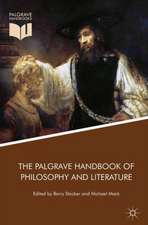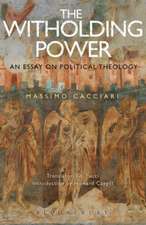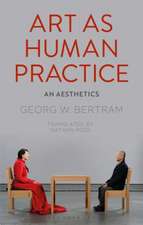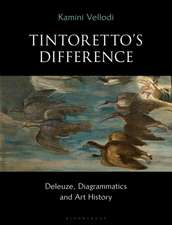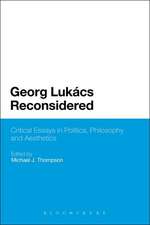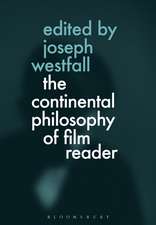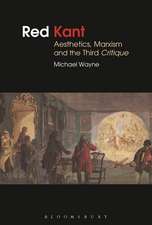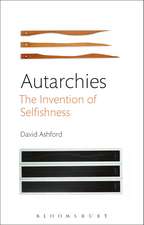Kafka: In Light of the Accident
Autor Howard Caygillen Limba Engleză Hardback – 13 dec 2017
Preț: 285.66 lei
Preț vechi: 311.62 lei
-8% Nou
Puncte Express: 428
Preț estimativ în valută:
54.66€ • 57.22$ • 45.23£
54.66€ • 57.22$ • 45.23£
Carte disponibilă
Livrare economică 17-31 martie
Preluare comenzi: 021 569.72.76
Specificații
ISBN-13: 9781472595423
ISBN-10: 1472595424
Pagini: 264
Dimensiuni: 129 x 198 x 24 mm
Greutate: 0.41 kg
Editura: Bloomsbury Publishing
Colecția Bloomsbury Academic
Locul publicării:London, United Kingdom
ISBN-10: 1472595424
Pagini: 264
Dimensiuni: 129 x 198 x 24 mm
Greutate: 0.41 kg
Editura: Bloomsbury Publishing
Colecția Bloomsbury Academic
Locul publicării:London, United Kingdom
Caracteristici
Proposes an original philosophical interpretation of Kafka by drawing on hitherto unexplored and unavailable historical and material evidence, that focuses on the philosophical impact of Kafka's work via an engagement with visual media, politics and cultural history
Notă biografică
Howard Caygill is a Professor at the Centre for Research in Modern European Philosophy, Kingston University, London, UK. He is the author of On Resistance (Bloomsbury, 2014).
Cuprins
Introduction: In The Light of the AccidentChapter 1 WritingsChapter 2 AccidentsChapter 3 ImagesChapter 4 DominationsChapter 5 Lights ConclusionBibliographyIndex
Recenzii
By venturing into uncharted territory with sophistication, Caygill provides an insightful reexamination of well-known texts and he demonstrates the value of unfamiliar resources. Hopefully, Kafka: In light of the Accident will inspire future Kafka readers to explore and appreciate the role of accident and chance in his work.
A significant contribution to literature and the philosophy of the accident: it intricately interweaves a sociological account of modernity's differential distribution of chance, a reflection on art's illumination of the accidental beginning of defiance and a unique interpretation of Kafka's writing.
Kafka's writings include legal briefs displaying his expertise in accident insurance together with his fiction, in which accidents are an obsessive theme. With philosophical imagination and scrupulous erudition, Howard Caygill explores this connection to produce fascinating new perspectives on both genres. His conceptual armature makes possible an especially profound and original reading of Kafka's "In the Penal Colony." No reader of Caygill's Kafka will fail to be elated.
Is this book a book? Is it a photograph rather? A film? Or a long parable? Exploring the very centre of Kafka's double life as an author and an insurance company employee, Caygill puts all genres at risk, thus engaging writing in a hazardous and splendid new metamorphosis.
No work on Kafka (or much else) I know of marries scholarly rigour so effortlessly to speculative risk. By placing at the centre of the corpus the accident, the question that links Kafka's unfamiliar daylight writing for the insurance industry to the night writing we know so well, Caygill discloses an unsuspected strain of defiance and unpredictability in a writer we've come to associate almost reflexively with the inexorable Law of the Father. The result is that impossible thing, a reading of Kafka as original as it is brilliant; you might want to insure yourself against falling off your chair.
With a lucidity and scholarly depth that is characteristic of all his work, Howard Caygill offers what many might have thought impossible: an original interpretation of Kafka's work. Connecting together the day time writer of insurance reports with the night time writer of fictions, Caygill reveals how Kafka's work is pervaded by an uncanny encounter with the necessity of accidents. Kafka:in Light of the Accident is an exceptional work of both philosophy and criticism. It enables us to understand how radical a writer Kafka is, one whose true modernity we are only just beginning to discover.
A significant contribution to literature and the philosophy of the accident: it intricately interweaves a sociological account of modernity's differential distribution of chance, a reflection on art's illumination of the accidental beginning of defiance and a unique interpretation of Kafka's writing.
Kafka's writings include legal briefs displaying his expertise in accident insurance together with his fiction, in which accidents are an obsessive theme. With philosophical imagination and scrupulous erudition, Howard Caygill explores this connection to produce fascinating new perspectives on both genres. His conceptual armature makes possible an especially profound and original reading of Kafka's "In the Penal Colony." No reader of Caygill's Kafka will fail to be elated.
Is this book a book? Is it a photograph rather? A film? Or a long parable? Exploring the very centre of Kafka's double life as an author and an insurance company employee, Caygill puts all genres at risk, thus engaging writing in a hazardous and splendid new metamorphosis.
No work on Kafka (or much else) I know of marries scholarly rigour so effortlessly to speculative risk. By placing at the centre of the corpus the accident, the question that links Kafka's unfamiliar daylight writing for the insurance industry to the night writing we know so well, Caygill discloses an unsuspected strain of defiance and unpredictability in a writer we've come to associate almost reflexively with the inexorable Law of the Father. The result is that impossible thing, a reading of Kafka as original as it is brilliant; you might want to insure yourself against falling off your chair.
With a lucidity and scholarly depth that is characteristic of all his work, Howard Caygill offers what many might have thought impossible: an original interpretation of Kafka's work. Connecting together the day time writer of insurance reports with the night time writer of fictions, Caygill reveals how Kafka's work is pervaded by an uncanny encounter with the necessity of accidents. Kafka:in Light of the Accident is an exceptional work of both philosophy and criticism. It enables us to understand how radical a writer Kafka is, one whose true modernity we are only just beginning to discover.






